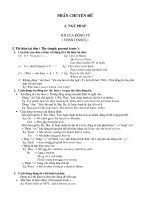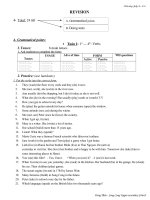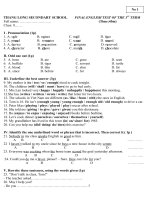On tap tieng anh 12
Bạn đang xem bản rút gọn của tài liệu. Xem và tải ngay bản đầy đủ của tài liệu tại đây (221.01 KB, 14 trang )
Saturday, July 06, 2013
Revision
Total: 24 tiÕt
A. Grammatical points:
• TuÇn 1 : 1
st
– 4
th
: Verbs
I. Tenses: 6 main tenses
1. Ask students to complete the form:
Tenses
Usage
Advs of time
Form
WH questions
Active Passive
……………..
……………..
……………..
……………..
…………….
……………..
……………..
……………..
……………..
………..
………..
………..
……….
………..
………...
……………
……………..
………………
2. Practice: (use handouts)
1. Put the verbs into the correct form:
1. They (wash) the floor every week and they (do) it now.
2. She (not, work), she (swim) in the river now.
3. Ann usually (do) the shopping, but I (do) it today as she is not well.
4. What she (do) in the evening? She usually (play) cards or (watch) T.V
5. How you (go) to school every day?
6. He (play) the guitar outside his house when someone (open) the window.
7. Some animals (not, eat) during the winter.
8. She (not, see) Peter since he (leave) the country.
9. When I got up, it (rain).
10. Mary is a writer .She (write) a lot of stories.
11. Our school (build) more than 15 years ago.
12. Listen! What they (speak)?
13. Marie Curie was a famous French scientist who (discover) radium.
14. Jane (work) in the garden and Tom (play) a game when I got home.
15. Linh (live) in Hanoi but her brother Minh (live) in Thai Nguyen. He (arrive)
yesterday to visit her. She (love) her brother and is happy to be with him. Tomorrow she (take) him to
some interesting places in Hanoi.
16. You (see) this film? - Yes, I have. +When you (see) it? - I (see) it last week.
17. When I (come) to see you yesterday, she (cook) in the kitchen .Her husband (be) in the garage .He (clean)
his car .Their children (play) games.
18. The steam engine (invent) in 1784 by James Watt.
19. Many factories (build) in Song Cong in the future.
20. Peter (take) to school every day by his father.
21. Which language (speak) on the British Isles two thousands years ago?
D¬ng Th¶o– Song Cong Upper-secondary School
A. Grammatical points
B. Doing tests
Saturday, July 06, 2013
22. When he was a boy at school, Edison asked a lot of questions. The teacher (1.think) he was stupid and
she (2.send) him home. Edison’s mother (3.teach) her son at home and he (4.begin) to carry out a lot of
experiments.
23. Last night I (have) dinner at a restaurant when Harry Steel (come) in. Harry (use) to work in a lawyer’s
office years ago, but now he (work) at a bank. He has a good job now. He (get) a good salary but he
always (borrow) money from his friends and never (pay) it back. Since I knew him, he (not, borrow) any
money from me.
24. I (1.never, meet) anyone famous yet. Have you? ~Yes, I (2. have). I (3.meet) Elton John in New York in
1998 and we (4.talk) to each other a lot.
25. Last night when I (do) my homework, the light (go) out.
26. I (1.see) Tom again yesterday .You (2.worry) about him, aren’t you ? Well, (3.not, worry) about him. I
(4.bring) him for dinner next weekend so you can (5.meet) him.
27. Jack (1.come) from London. He (2.come) to Hanoi to learn Vietnamese two years ago. At first, he
(3.find) it difficult to pronounce Vietnamese words but now his Vietnamese (4.improve).Next week, he
(take) an examination. If he (pass) it, he (get) a certificate.
28. They (live) in Oxford for 10 years, then (move) to London in 1999. They now (live) in Manchester.
29. What you (do) at 7 P.M. last night? + Mary (write) a letter and I (watch) T.V
30. Your hair looks different. You (have) a haircut?
31. He (read) books when Mary saw him.
32. You (go) to the party last night? – Yes, I (go) with my girlfriend.
33. Mary and John are neighbours. They (know) each other for several years. John (move) to this area in
1999. They always (help) each other in their life.
34. I (receive) a letter from my sister this morning. In it, she (say) she (come) to see me next month.
35. James Watt (be) a Scottish inventor .He (invent) the steam engine in 1784.
2. Use the given word to make full sentences:
1. Two thousand years ago/ British Isles/ inhabit/ speakers of Celtic languages.
2. The Anglo-Saxon/ speak/ Germanic language/ form/ basis of modern English.
3. Modern English/ different/ old English?
4. What/ make/ English/ international?
5. Ernest Hemingway/ born/ 1899/ die/ 1961.
6. Mark Twain/ write “Tom Sawyer and Huckleberry Finn”/ famous all over the world.
7. Marie Curie/ French physicist/ father/ Polish.
8. A classroom/ place/ have/ lessons.
9. Life on earth/ destroy/ if/ nuclear tests/ not stop.
10. The boy/ die/ unless/ he/ send/ for a doctor.
11. If/ I/ be/ your position/ I/ act/ differently.
12. My brother/ interested/ watch English evening news.
13. They/ fond/ go/ swim?
14. She/ fed up/ look after/ children.
15. Warmer/ today/ than/ yesterday.
16. English/ speak/ over/ world.
17. Jack London/ 1876/ 1916.
18. Mother/ go/ shopping/ twice/ week.
19. Last summer/ holiday/ in Samson.
20. They/ already/ their homework.
D¬ng Th¶o– Song Cong Upper-secondary School
Saturday, July 06, 2013
21. We/ not/ go/ school/ Sunday.
22. Last summer/ friend/ Charles/ invite/ me/ stay/ with him.
23. Since/ leave/ school/ Charles/ live alone.
24. How long/ you/ stay/ your aunt/ last summer?
25. My friend/ going/ give/ birthday party/ next week.
26. Weather/ so warm/ I/ not need/ thick coat.
27. Piano/ be/ too heavy/ John/ move/ by himself.
28. child/ I/ used/ spend/ summer holiday/ native village.
29. Yesterday/ I/ take/ shirt/ salesperson/ whom/ I/ buy/ it.
30. I/ rather/ you/ stay/ home.
• TuÇn 2 : 5
th
– 8
th
: Nouns & articles
I. Theory:
1. Nouns:
o Definition:
Nouns are used to name things, persons, and phenomenon.
o Kinds of nouns:
There are four kinds of nouns:
- Common nouns: dog, man, table, cream, gold, ….
- Proper nouns: France, David, London, River Thames. …
- Abstract nouns: beauty, love, happiness, courage, weather, …
- Collective nouns: crowd, team, class, group, …
o Countable and uncountable nouns:
a. Countable nouns: show the things which can be counted: one banana, two accidents, an
apple, …
- Singular nouns: ‘a’, ‘an’, ‘the’, possessive adjectives can be put in front of singular
nouns.
- Plural nouns: ‘the’, cardinal numbers, possessive adjectives, ‘some’, ‘any’, ‘few’, ‘a
few’, ‘many’, ‘a lot of’ can be out in front of plural nouns.
b. Uncountable nouns: showing the things which can not be counted and has only one form:
beauty, love, happiness, cream, gold, tea, …
- ‘a’, ‘an’, cardinal numbers can’t be put in front of uncountable nouns.
- ‘the’, ‘some’, ‘any’, ‘little’, ‘a little’, ‘much’, ‘a lot of’ and possessive adjectives can
be put in front of uncountable nouns.
o How to change a singular noun into a plural: add ‘s/ es’ into singular nouns (except
some irregular nouns)
o Some ways of forming nouns:
- noun = V + ing (smoking, drinking, cooking , …)
- noun = V + tion (invention, action, extinction, creation, prevention, pollution,
explanation, production, attention, …)
- noun = V + er/ or (inventor, visitor, speaker, listener, …)
- noun = V + ment (treatment, development, employment, movement, …)
- noun = adjective + ness (goodness, kindness, happiness, narrowness, …)
- noun = adjective + ility (possibility, flexibility, ability, …)
D¬ng Th¶o– Song Cong Upper-secondary School
Saturday, July 06, 2013
2. Articles:
o Definition:
An articles is a part of speech which identifies or classifies the nouns.
o Kinds of articles:
- Indefinite articles: ‘a’, ‘an’ are used before singular countable nouns. ‘a’ goes before a
noun beginning with a consonant or a semi vowel in pronunciation. ‘an’ goes before a
noun beginning with a vowel.
- Definite articles: ‘the’ can be used in front of a singular noun, plural noun, and
uncountable noun to identify it. It can be used in front of a particular noun or a noun
which we all know. And it also stands in front of a unique thing.
II. Practice:
1. Give the correct form of the words in brackets:
1. (employ) among young people is now a serious problem in many countries.
2. John is from England. He is not used to (drive) on the right side of the road.
3. People living in my area now realize the (important) of a good environment.
4. Their children are fond of (read) picture books.
5. Humphry Davy helped Faraday much in his later (discover).
6. We had a lot of (difficult) in learning English.
7. Peter stopped (smoke) three months ago.
8. These animals are in danger of (extinct).
9. He made too many mistakes in his (write).
10. Have you seen the latest (advertise) for Pepsi?
11. She is a (collect) of theatre programmes.
12. English tends towards (simple). This is its (strong).
13. During his (child), he lived with his family in Cornwall.
14. She divorced him because of his (kind).
15. I’d like to book a (fly) to Paris.
16. Read a label on a product. It can give you some useful (inform).
17. My uncle is a (science). He often does research in his laboratory.
18. I don’t really think he has the (able) to do this job.
19. Scientists and doctors are finding a new (treat) for cancer.
20. English has undergone the (assimilate) of borrowings.
21. Latin was the language of (govern) from 43 B.C. to about A.D 410.
22. Faraday did not have much (school) when he was young.
23. He became famous at the (old) of 21.
24. He made much progress in (electric).
25. (eat) and physical (act) add to the causes of several of the killing diseases.
26. Surgeons have tried to reduce the number of (die).
27. David speaks English very (fluent).
28. He is a (fun) person. He often makes me laugh
29. The film is (bore), so I’m (bore).
30. That was an (excite) match, wasn’t it? I was (excite) to see it.
31. She is so (beauty) that everyone loves her.
32. She danced so (beauty) that the audience clapped their hands many times.
33. Mrs. Kent is interested in (go) out now and then.
34. One of the (bad) diseases that mankind has ever had is AIDS.
35. It is too hot. Let’s go (swim).
36. The cartoon last night was very (interest).
37. Rubber trees are very (use).
D¬ng Th¶o– Song Cong Upper-secondary School
Saturday, July 06, 2013
38. What would happen if rare and (use) animals became extinct?
39. It’s the written English which is not (system) phonetics that causes difficulties to foreigners.
40. A (physic ) is a person who studies physics .
41. There are many new centers with many different (attract).
42. London is very famous for some (attract) parks.
43. English is the (effect) medium of international communication .
44. If we do nothing to protect our environment, our life will be (affect).
45. Oscar eats too much chips so she is (weigh).
46. Your new dress makes you more (beauty).
47. Bill is a good driver .He usually drives (care).
48. Marie Curie’s (discover) of radium made her famous.
49. There are not many (differ) between American and British English .
50. This man gets (employment) benefit because he has no job now.
51. Her parents (courage) her to apply for the job .
52. It’s a nice shop and the assistants are all polite and (help).
53. When I have to wait for a long time to be served I started to feel (patient).
54. He cycled (care) and had an accident.
55. She is very (success) in her job.
56. Although he is now middle-aged, he still looks quite (youth).
57. My Thuan bridge is the (long) bridge in Vietnam.
58. They wants to escape from the (noisy) and bustle of the town.
59. Lan had a lot of (difficult) in learning English.
60. Nam stopped (learn) English two months ago.
61. He is very (interest) in English and Mathematics.
62. Their (friend) has lasted a lifetime.
63. He is very handsome and (friend).
64. Many women nowadays are fond of (play) football.
65. Sports are very good for our (healthy).
66. English is the most (wide) used language in the world.
67. What would happen if rare and (use) animals became extinct?
68. He comes from Paris .He speaks (France).
69. John enjoys (sing) Vietnamese songs.
70. He has (succeed) in giving up smoking.
2. Put in ‘the’, ‘a/ an” where necessary:
1. This morning, I bought … newspaper and … magazine. … newspaper is in my bag, but I don’t know
where I put … magazine.
2. I saw … accident this morning. … car crashed into … tree. … driver of … car wasn’t hurt but … car
was badly damaged.
3. There are two cars parked outside: … big one and … grey one. … blue one belongs to my neighbours;
I don’t know who … owner of … grey one is.
4. My friends live in … old house in … small village. There is … beautiful garden behind … house. I
would like to have … garden like that.
5. This house is very nice. Has it got … garden?
6. It’s a beautiful day. Let’s sit in … garden.
7. … television was on but nobody was watching it.
8. Mary and I arrived at … same time.
9. A: Where did you have … lunch? B: We went to … restaurant.
10. You’ll find … information you need at … top of … page 85.
11. There isn’t … airport near where I live. … nearest one is about 70 kilometers away.
12. I’m going for … week in September.
13. A: Did you have … nice holiday? B: Yes, it was … best holiday I’ve ever had.
D¬ng Th¶o– Song Cong Upper-secondary School









